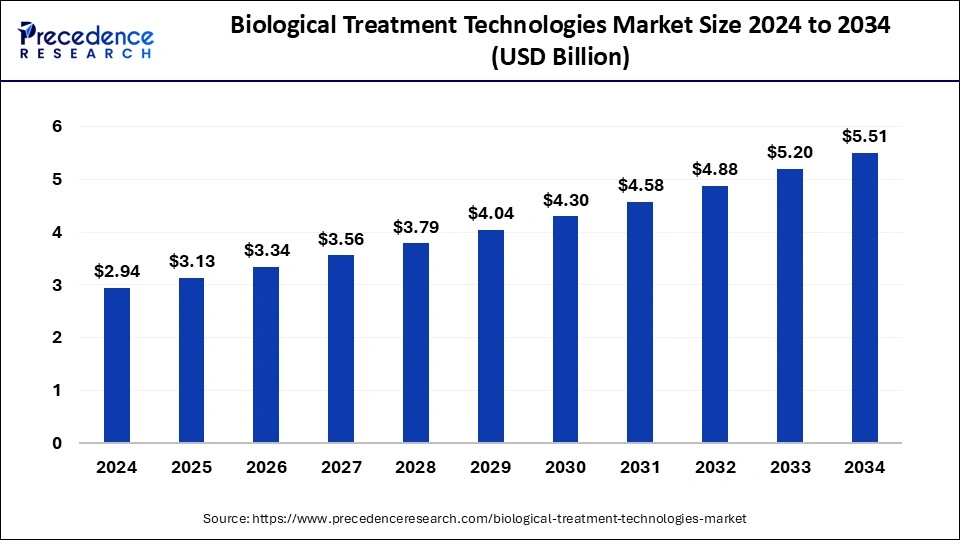The global biological treatment technologies market size reached USD 2.76 billion in 2023 and is expected to surpass around USD 5.20 billion by 2033. at a solid CAGR of 6.55% from 2024 to 2033.
Biological Treatment Technologies Market Key Points
- North America dominated the biological treatment technologies market in 2023.
- Europe is estimated to be grow at a notable rate during the forecast period.
- By treatment, the anaerobic digestion segment dominated the market in 2023 and is the fastest-growing during the forecast period.
- By application, the industrial segment dominated the biological treatment technologies market in 2023.
- By application, the residential segment is expected to be the fastest-growing during the forecast period.

Biological treatment technologies encompass a range of processes used to treat wastewater, industrial effluents, and contaminated soil through biological reactions mediated by microorganisms. These technologies are crucial for addressing environmental concerns related to pollution and wastewater management. Key technologies include aerobic and anaerobic processes, biofiltration, and bioremediation, each tailored to specific contaminants and environmental conditions.
Get a Sample: https://www.precedenceresearch.com/sample/4582
Growth Factors
The Biological Treatment Technologies Market is witnessing significant growth driven by several key factors. Firstly, increasing environmental regulations worldwide mandate stringent wastewater treatment standards, propelling the adoption of advanced biological treatment technologies. Secondly, rising industrialization and urbanization rates contribute to higher volumes of wastewater and industrial effluents, creating demand for efficient treatment solutions. Moreover, technological advancements in microbial genomics, bioreactor design, and bioinformatics enhance treatment efficiency and expand application areas.
Regional Insights
Regionally, the adoption of biological treatment technologies varies based on regulatory frameworks, industrial activities, and environmental concerns. North America and Europe lead in technology adoption due to stringent environmental regulations and high awareness of sustainability. Asia-Pacific is experiencing rapid market growth driven by industrial expansion and increasing investments in environmental infrastructure. In contrast, regions in Africa and Latin America are gradually adopting these technologies, influenced by economic development and infrastructure investments.
Biological Treatment Technologies Market Scope
| Report Coverage | Details |
| Market Size by 2033 | USD 5.20 Billion |
| Market Size in 2023 | USD 2.76 Billion |
| Market Size in 2024 | USD 2.94 Billion |
| Market Growth Rate from 2024 to 2033 | CAGR of 6.55% |
| Largest Market | North America |
| Base Year | 2023 |
| Forecast Period | 2024 to 2033 |
| Segments Covered | Treatment, Application, and Regions |
| Regions Covered | North America, Europe, Asia-Pacific, Latin America, and Middle East & Africa |
Biological Treatment Technologies Market Dynamics
Drivers
Several drivers propel the growth of the Biological Treatment Technologies Market. Increasing awareness of environmental sustainability drives industries to invest in eco-friendly wastewater treatment solutions. Technological innovations, such as membrane bioreactors (MBRs) and advanced oxidation processes (AOPs), enhance treatment efficiency and reduce operational costs. Moreover, government initiatives promoting wastewater recycling and reuse bolster market demand. The pharmaceutical and food processing industries are significant contributors to market growth, prioritizing environmental compliance and sustainable practices.
Opportunities
The Biological Treatment Technologies Market offers numerous opportunities for growth and innovation. Expansion in emerging markets presents untapped opportunities for technology providers and equipment manufacturers. Innovations in bioremediation technologies, including nanotechnology applications and genetically engineered microorganisms, open new avenues for addressing complex contaminants. Furthermore, the integration of IoT and AI in biological treatment processes enables real-time monitoring, predictive maintenance, and operational optimization, enhancing efficiency and reliability.
Challenges
Despite growth prospects, the Biological Treatment Technologies Market faces several challenges. High initial capital investments and operational costs deter small-scale industries from adopting advanced treatment technologies. Regulatory complexities across different regions pose challenges for technology standardization and market entry. Moreover, the variability in wastewater composition and seasonal fluctuations in treatment performance necessitate adaptable and robust treatment solutions. Addressing public perception and skepticism regarding the safety and effectiveness of biotechnological approaches remains crucial for market acceptance and growth.
Read Also: Self-Driving Cars and Trucks Market Volume to Cross 7112.07 Thousand Units by 2033
Biological Treatment Technologies Market Companies
- Scarab International
- Alfa Laval
- Pentair PLC
- Evoqua Water Technology
- Closed Loop Environmental Solution Pty Ltd
- Supreme International Limited
- Alfa-Therm Limited
- Composting Solutions Ltd.
- BIFFA Plc. (Buckinghamshire)
- BioCo Tech AS
Recent Developments
- In April 2022, a permitting phase of development for a new anaerobic digestion and renewable natural gas facility in the heart of Kentucky’s distillery region was launched by Synthica Energy LLC.
- In August 2022, the Australian First Diaper Recycling Trial was launched by Kimberly-Clerk. To convert the organic materials in these used diapers into bioenergy and nutrient-rich compost, the Nappy Loop trial uses anaerobic digestion.
- In August 2023, in Sangamihara, Kanagawa Prefecture, in Japan, the successful completion of the 530 kWe “Sangamihara Biogas Power” biogas plant was announced by the HoSt Group. The biogas facility has begun converting food waste and pig food waste into feeding electricity and renewable electricity. The project has a positive sustainability impact on the company, the local community, and its production processes and supports sustainable development goals, including climate action, responsible consumption and production, sustainable cities and communities, industry, innovation, and infrastructure, and affordable and clean energy.
- In November 2023, recycling wastewater into compost was started by Timaru’s DB Draught Brewery, at Washdyke. The company started to operate its new wastewater plant three years after work started on the project. Before that, the brewery used the Timaru District Council’s municipal wastewater disposal system.
- In January 2024, a campaign against plans to build an anaerobic digestion plant was launched by the Villagers in Great Bowden.
Segments Covered in the Report
By Treatment
- Composting
- Vermicomposting
- Black Soldier Fly Treatment
- Anaerobic Digestion
- Fermentation
By Application
- Residential
- Commercial
- Industrial
By Geography
- North America
- Asia Pacific
- Europe
- Latin America
- Middle East & Africa
Contact Us:
Mr. Alex
Sales Manager
Call: +1 9197 992 333
Email: sales@precedenceresearch.com
Web: https://www.precedenceresearch.com
Blog: https://www.expresswebwire.com/
Blog: https://www.uswebwire.com/
